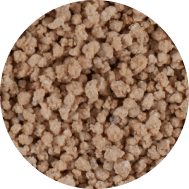Dry period optimization

MAG26, Phosphea’s magnesium phosphate, is suitable for ruminants as it brings a high available source of phosphorus (P) and magnesium (Mg) in granules. The intrinsic pH of MAG26, combined with a progressive release of phosphorus (Pse>20%) in the rumen, gives it an interesting buffering capacity which allows to improve ruminal fermentations. As MAG26 brings 26% of high available Mg, it contributes to reduce the risk of hypomagnesemia and hypocalcemia during the dry period. Offering a reactivity 2 times to 4 times lower than an MCP and MgO mixture, it can partially replace both MCP and MgO of premixes and minerals formulas. Phosphea recommends this magnesium phosphate solution during dry period and early lactation.
MAG26 contains 14% P with a Pse > 20%. MAG26 is the feed phosphate with the best relative biological value (RBV) in ruminants (101%). The in vitro study conducted with Groupe Roullier Research Center (CMI) in 2019, revealed a distinctive behavior of MAG26 compared to other phosphates. Indeed, under ruminant conditions, the phosphorus (P) of MAG26 magnesium phosphate is progressively released over time. However, the phosphorus requirement of bacteria is 2 times higher than the maintenance requirement of the cow (Meschy, 2007). This positive release of P thus favored rumen microbial activity.


MAG26 contains 26% magnesium highly available to the animal (RBV 86%). Compared to a calcium phosphate, the magnesium phosphate MAG26 has an alkalinizing effect, which allows to regulate the ruminal pH, thus reflecting the interest of combining this phosphate with a buffer solution. This combination of phosphorus and magnesium provides a favorable environment for ruminal fermentations.
Compared to formulas containing monocalcium phosphate (MCP) and magnesium oxide (MgO), MAG26 – used alone or in combination with feed phosphate or MgO – is able to reduce the reactivity of your mineral mixtures.